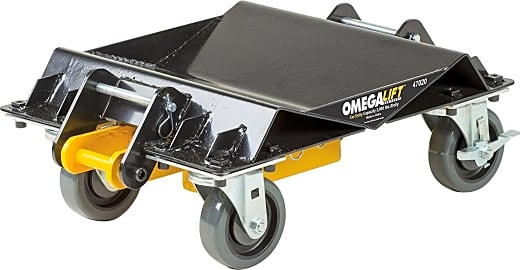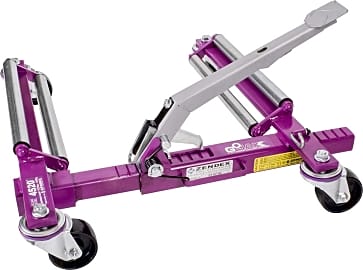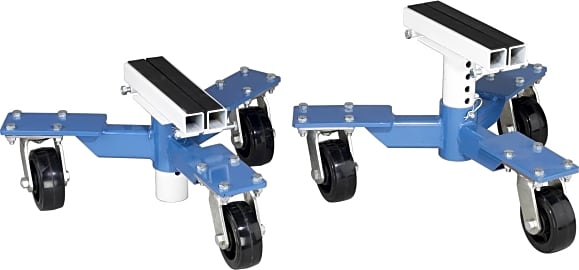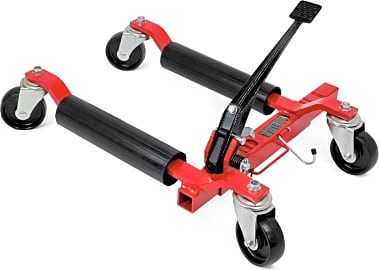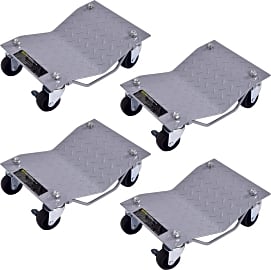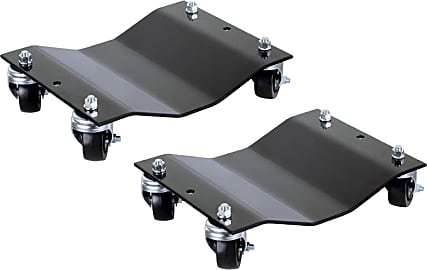The 7 Best Car Dollies

This wiki has been updated 35 times since it was first published in March of 2016. Perfect for any automotive shop, these car dollies let one person maneuver a vehicle around with ease while working on it without having to start it or use the transmission. We've also included models priced within the range of home mechanics who like to work on their vehicles themselves. They’re sold individually and in sets of two or four, so you can select however many you need. When users buy our independently chosen editorial choices, we may earn commissions to help fund the Wiki.
Editor's Notes
May 21, 2021:
We removed a pair of unavailable models that were essentially identical to the Pentagon Tools 5061 Two-Pack and Goplus Skates, which are both great fixed-height options. Instead, we've added the Omega 47020, which is about as advanced as its type gets. It's also remarkably heavy-duty and versatile. The other addition is the Stark USA Hydraulic, which is similar to top picks Eastwood MH8016 and Gojak G4520, although slightly less heavy-duty and also more affordable.
Bear in mind that for a safe working environment, it's always important to have a set of reliable jack stands.
February 27, 2020:
Removed the Capri Tools Hydraulic because of availability issues. Added the Eastwood MH8016 and the Gojak G4520.
High-quality car dollies can help save a lot of time when starting a car is not an option or when ventilation is a concern - particularly when they are hydraulic. The Eastwood MH8016 and the Gojak G4520 both offer powerful jacking action while taking into account longevity with features like steel lock pins. This allows you to release the load and transfer it onto the frame instead of relying on the hydraulic pressure to hold up the car. This is not only safer, but it prevents a common cause of leaks and failure. Another feature of both the Eastwood and Gojak is double ball bearing casters which make it plausible for one person to move a car on their own - many other models claim that their product can be used by one person but realistically, you'll need at least two people on anything larger than a Miata.
Always ensure that you properly support your vehicle with adequately rated stands before working on it to prevent personal injury or damage to the equipment.
Traditions Of Fine Craftsmanship
It's this clever nature, along with incredible curiosity, that has helped propel humans to make constant technological breakthroughs.
Tool use is a unique gauge of a species' intelligence. It's well-known that primates have used tools since our shared ancestors' emergence, but elephants, dolphins, and wide variety of birds also use foreign objects to gain advantages over the rest of nature.
It's this clever nature, along with incredible curiosity, that has helped propel humans to make constant technological breakthroughs. A few thousand years ago, the wheel itself was a new, cutting-edge development, and even such simple machines as levers and wedges still called for additional research. In the 1700s, coinciding with Europe's Industrial Revolution, the steam engine came into existence, first as a means of extracting water from flooded mines. A handful of vehicles came about with steam power, but this external-combustion system proved too sensitive and costly for general use. 1885 saw the sale of the first production vehicle, several of which were designed and built by Karl Benz, whose name lives on in one of today's most renowned luxury brands. Thanks to Nikolaus Otto's four-cycle design gaining traction at the end of the 19th century, gas-powered cars finally began their rise to prominence over the first half of the 1900s.
And you can bet that as soon as people started driving them, they started breaking.
The aristocracy was the first group to widely buy into the automobile craze, and they were far less likely to drive their own carriage than many rich folk are today. As such, the ability to fix cars has been separate from the ability to own them from the very beginning. The first arrangements were between the owners and their drivers, who had specialized knowledge of these new and intricate inventions, and they used that knowledge to leverage better pay and treatment from their employers.
Things changed after the first generation of cars came and went, thanks to the industrial innovation of Henry Ford's newly refined assembly line. This highly efficient system dramatically cut production time and cost, driving prices down to a point that the average worker could afford. This, in fact, was one of Ford's goals, and his success at putting most employees inside the vehicles they built, while putting their money right back in his coffers, stands as a cornerstone of modern American capitalism. But even more importantly from an automotive standpoint, this normalization meant that different models shared certain characteristics, making repair and modification knowledge accessible to all. Not only does the Ford Model T represent the rise of the American middle class, it also signifies the beginning of auto mechanics as we know them.
A Grueling And Greasy Undertaking
It takes a certain mindset to willingly sacrifice one's knuckles, and possibly sanity, just for the sake of a working vehicle. A lot of people opt for leases and dealership warranties because the newest systems tend to be incredibly complex. But there are plenty of models on the road that aren't too intimidating, as well as some that are simply prone to needing maintenance, and frequent trips to the mechanic add up quickly.
There are a lot of maintenance tasks that average car owner accomplish all on their own, even with just a modicum of automobile knowledge.
There are a lot of maintenance tasks that average car owner accomplish all on their own, even with just a modicum of automobile knowledge. Changing brake pads and rotors, draining and replacing oil, modifying stereo systems, and swapping out spark plugs are all pretty common occurrences throughout every car's life, and they're not terribly difficult.
But if you're a bit of a gearhead, you're probably prepared to do more than just maintain your ride. And, frankly, the average consumer probably shouldn't be dropping their transmission pan, but if you know what you're doing, you know that it's worth doing right. While a tie rod end is something that an intermediate DIY mechanic could probably figure out, it takes considerably more know-how to press bearings back into place while reassembling your springs and dampers. Those who are willing to brave their chariot's underbody, though, will find it particularly satisfying to drive a car that they successfully maintain on their own.
But it's not all fun and games; even seemingly innocuous jobs can be frustrating, dirty, and painful without the proper tools and attention.
Tools, Tools, and More Tools
The right equipment is paramount not only to getting the job done right, but doing so safely. You wouldn't work on a vehicle without disconnecting the battery, nor would you crawl under it without sturdy blocks or jack stands. Of similar importance is personal protective equipment; gloves, goggles, and long-sleeve shirts are all recommended. Additionally, it's imperative to be aware of the various chemicals you'll encounter; always ensure there's proper ventilation in your work area.
Of similar importance is personal protective equipment; gloves, goggles, and long-sleeve shirts are all recommended.
If you're working alone and need to maneuver a vehicle around the workshop, or if you're working on certain suspension or steering parts that need to maintain pressure during adjustment, you may need a good set of dollies. Just like a creeper seat puts a mechanic on wheels and makes it easy to slide across a garage floor, car dollies sit between the wheels and the floor and make it a snap to move the vehicle in any direction with a moderate push. At the same time, they add enough lift to let you slide underneath and start performing maintenance.
They're relatively simple items, usually consisting only of steel plates and high-impact polymer casters. Some models feature high-traction diamond plating, some have variable heights, and still others sport hydraulic releases for quick installation and removal without the aid of a jack. You might experience a touch of sticker shock when first examining some of the options, but keep in mind that these are crafted to hold thousands of pounds of metal mid-air, and to do so reliably for many years. So, it's worth taking your time and finding a set that will last at least for the life of your current vehicle. And while you're at it, don't forget to take a look at a good jack and possibly some stationary stands.


